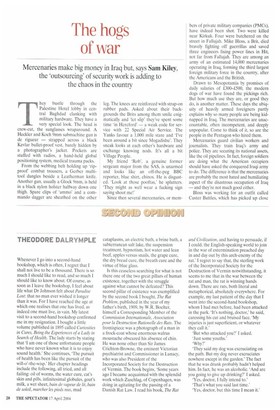THEODORE DALRYMPLE
Whenever I go into a second-hand bookshop, which is often, I regret that I shall not live to be a thousand. There is so much I should like to read, and so much I should like to know about. Of course, as soon as I leave the bookshop, I feel about life what Dr Johnson felt about Paradise Lost: that no man ever wished it longer than it was. For I have reached the age at which one realises that one has lived, as indeed one must live, in vain. My latest visit to a second-hand bookshop confirmed me in my resignation. I bought a little volume published in 1895 called Curiosities in Cures, Being the Experiences of a Lady in Search of Health. The lady starts by stating that 'I am one of those unfortunate people who have never known what it is to enjoy sound health.' She continues, 'The pursuit of health has been like the pursuit of the will-o'-the-wisp.' Her chapter headings include the following, all tried, and all failing: oil of worms, the water cure, cat's skin and pills, infinitesimal globules, goat's milk, a wet sheet, bain de vapeur de lit, bain de soleil, marcher les pieds nus, mud cataplasms, an electric bath, a brine bath, a subterranean salt lake, the suspension treatment, hypnotism, hot water and lean beef, apples versus snails, the grape cure, the dry bread cure, the breath cure and the virtue of blue glass.
Is this ceaseless searching for what is not there one of the two great pillars of human existence, together with the struggle against what cannot be defeated? This second pillar of existence was exemplified by the second book I bought, The Rat Problem, published in the year of my father's birth, 1909, by W.R. Boelter, himself a Corresponding Member of the Commission Internationale, Association pour da Destruction Rationelle des Rats. The frontispiece was a photograph of a man in a frock-coat whose enormous walrus moustache obscured his absence of chin. He was none other than Sir James Crichton-Browne, the eminent Victorian psychiatrist and Commissioner in Lunacy, who was also President of the Incorporated Society for the Destruction of Vermin. The book begins, 'Some years ago I became acquainted with the splendid work which Zuschlag, of Copenhagen, was doing in agitating for the passing of a Danish Rat Law, I read his book, The Rat and Civilization, and having to persuade, if I could, the English-speaking world to join in the war of extermination preached day in and day out by this arch-enemy of the rat.' I regret to say that, the sterling work of the Incorporated Society for the Destruction of Vermin notwithstanding, it seems to me that in the war between the rat and man, the rat is winning hands down. There are rats, both literal and metaphorical, absolutely everywhere. For example, my last patient of the day that I went into the second-hand bookshop, whom I had met before, had been attacked in the park. 'It's nothing, doctor,' he said, caressing his cut and bruised face. 'My injuries is just superficient, or whatever they call it.'
'But who attacked you?' I asked. 'Just some youths.'
'Why?'
'They said my dog was excruciating on the path. But my dog never excruciates nowhere except in the garden.' The fact that he was drunk probably hadn't helped him. In fact, he was an alcoholic. 'And are you going to give up drinking?' I asked.
'Yes, doctor, I fully intend to.'
'That's what you said last time.' 'Yes, doctor, but this time I mean it.'


































































 Previous page
Previous page